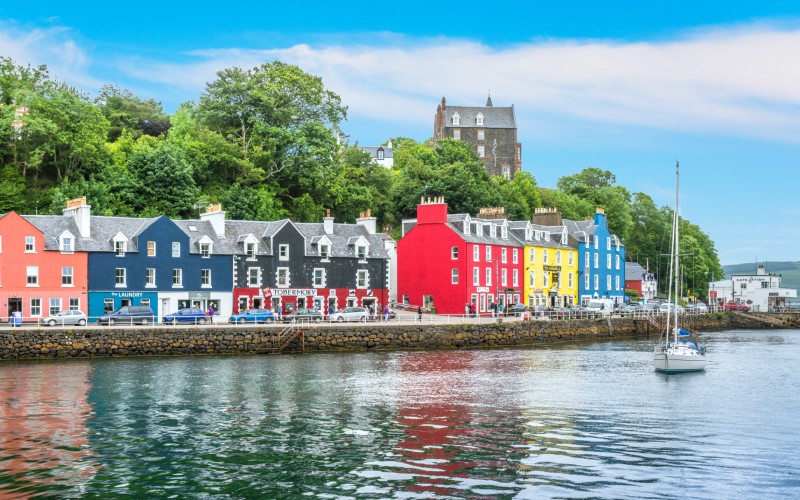
Key things that US citizens looking to relocate to Scotland need to know when checking their Scottish ancestry, British Citizenship and visa options.
Millions of American citizens can trace their roots to Scotland. This number even includes 35 of the nation’s Presidents who claim Scottish ancestry.
This connection – along with the global popularity of Scottish cultural icons like Harry Potter and Outlander – inspires hundreds of thousands of US visitors to Scotland every year. In 2022, a record 693,000 visits were made to Scotland from the USA.
The key question is whether Scottish heritage leads to British citizenship or the ability to live and work in the UK. As Scotland is part of the United Kingdom of Great Britain and Northern Ireland, most people born in Scotland, and some of those with Scottish ancestry, have a right to British citizenship or British citizenship by descent.
Could you be one of them? Thorntons Immigration explores some common questions for Scottish ancestry, British citizenship and if you have British citizenship by descent.
Can I apply to register as a British citizen based on having a Scottish-born grandparent?
It is possible to apply to register as a British citizen when you have a Scottish - or UK-born grandparent, through a process of British citizenship by double descent, but this depends on a number of circumstances:
- Where you were born
- When you were born
- Which grandparent(s) were born in Scotland or the UK
Why does it matter where I was born to be considered for British Citizenship by double descent?
The principle of “double descent” only applies to someone born in a “foreign country”. This means any country other than the UK and the Commonwealth, including the USA. If you are a US citizen but were born in a Commonwealth country (for example, you were born in Canada or Jamaica) you would not qualify under the double descent provisions. However, you may qualify for a UK ancestry visa.
Why does it matter when I was born to be considered for British Citizenship by double descent?
Entitlement to British citizenship based on grandparents' British citizenship comes from a principle called “double descent”. From 1 January 1983, British citizenship could only be transmitted to one generation born overseas although registration was permitted until 1 January 1988. Therefore, if you were born on or after 1 January 1988, you cannot benefit from having a UK-born grandparent. The exception to this rule is if you are a US citizen who holds dual citizenship with a Commonwealth Country; in these circumstances, you may qualify for a UK ancestry visa.
Why does it matter which grandparent was born in Scotland (or the rest of the UK)?
UK citizenship law previously treated men and women unequally, to correct this historical unfairness “double decent” of British citizenship is now permitted in certain circumstances.
UK born maternal grandfather
Those born overseas with a UK born maternal grandfather can apply to register as a British citizen in terms of Section 4C of the British Nationality Act 1981, providing they were born in a non-Commonwealth country before 1 January 1988 and their mother’s parents were married at the time of her birth.
UK born paternal or maternal grandmother
For people born before 1 January 1988 who have either a paternal or maternal grandmother, there is also good news. Whilst these applicants do not have an automatic statutory entitlement to register as British citizens, the Home Office have introduced a discretionary route to registration, for these types of applications in terms of Section 4L of the British Nationality Act. Legal representation is strongly represented for these types of cases in order to present the strongest possible case.
UK born paternal grandfather
Unfortunately for those with a UK-born paternal grandfather, their ability to inherit citizenship is dependent on their birth having been registered by their father at the British Consulate within twelve months of their birth. If their birth was not registered, the current Home Office position is that discretion is unlikely to be exercised in their favour. . The rationale is that an individual’s failure to qualify for British citizenship in these circumstances is not due to historical gender discrimination, but rather a failure on the part of the individual’s father to take the necessary registration steps.
How can I find out more about my British citizenship or UK Visa options?
UK immigration law is complex, technical and constantly changing. For a one-to-one advice session on your individual Scottish ancestry, or British citizenship by descent circumstances, we would strongly recommend that you consult with a specialist UK immigration solicitor.
For further information book a fixed fee consultation with Jacqueline Moore or a member of our Immigration team.
Thorntons is a full-service law firm with offices across Scotland, including an office in Inverness, the heart of the Scottish Highlands. For international clients looking to relocate to Scotland, we offer a one stop holistic service, covering all legal issues you need to consider from the outset of your move. Our legal specialists advise on everything from citizenship/UK visas to residential purchases to private wealth and inheritance planning issues. So, whether you are looking to buy a bothy or a castle in the Highlands or a flat in Edinburgh’s famous New Town, Thorntons Law can support you with every aspect of planning your exciting move to Scotland.
For legal advice and Visa support to start your move to the UK, contact Immigration Law specialist Jacqueline Moore or a member of Thorntons Immigration team on +44 3330 430350 or complete an online enquiry and a member of the team will contact you.
